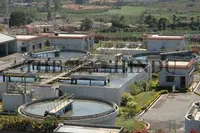Water Treatment Plant in bangalore, Bangalore
Water treatment plants in Bangalore play a crucial role in ensuring the city's residents have access to safe and clean drinking water. As the population grows and urbanizes, the demand for water treatment becomes increasingly important. Importance of Water Treatment Clean water is fundamental for public health, and water treatment plants in Bangalore are at the forefront of providing this essential resource. Ensuring that water is free from contaminants and meets stringent quality standards is paramount for preventing waterborne diseases and promoting overall well-being. Challenges in Water Treatment in Bangalore Despite their importance, water treatment plants in Bangalore face unique challenges. Rapid urbanization, industrial discharges, and agricultural runoff contribute to the complexity of water treatment. Addressing these challenges requires innovative solutions and continuous adaptation to the evolving environment. Technological Innovations Bangalore's water treatment plants leverage cutting-edge technologies to enhance efficiency and water quality. Advanced filtration systems, real-time monitoring, and data analytics contribute to a more effective and responsive water treatment infrastructure. Sustainability Practices In line with global environmental concerns, many water treatment plants in Bangalore prioritize sustainability. From energy-efficient processes to the reuse of treated water for non-potable purposes, these practices aim to reduce the ecological impact of water treatment. Community Involvement The success of water treatment efforts in Bangalore relies on the active involvement of local communities. Awareness campaigns, educational programs, and community engagement initiatives foster a sense of responsibility and encourage water conservation. Government Initiatives Government-led initiatives support the development and maintenance of water treatment infrastructure in Bangalore. These efforts include policy frameworks, funding support, and regulatory measures to ensure the effectiveness and sustainability of water treatment practices. Improvements Over Time Over the years, water treatment processes in Bangalore have evolved significantly. Technological advancements, coupled with a better understanding of water chemistry, have led to more efficient and reliable water treatment methods. Water Quality Monitoring Real-time monitoring of water quality is a crucial aspect of modern water treatment plants in Bangalore. This proactive approach allows for prompt detection of contaminants, ensuring a swift response to potential threats to water safety. Future Prospects The future of water treatment in Bangalore holds promise. Anticipated technological advancements, increased public awareness, and continued government support are expected to contribute to further improvements in water treatment infrastructure and practices. Case Studies Examining specific cases provides insights into the challenges and successes faced by individual water treatment plants in Bangalore. These real-world examples showcase the dynamic nature of water treatment in the city. Comparison with Global Standards Benchmarking Bangalore's water treatment practices against global standards helps identify areas for improvement and innovation. Learning from international best practices contributes to the continuous enhancement of water treatment processes. Public Awareness Programs Initiatives that educate the public about water conservation and treatment are integral to the success of water treatment efforts. Creating awareness fosters a sense of responsibility among citizens, encouraging sustainable water use. Conclusion In conclusion, water treatment plants in Bangalore are indispensable for maintaining the health and well-being of the city's residents. Technological innovations, sustainability practices, and community involvement collectively contribute to the success of water treatment initiatives. As Bangalore evolves, so does its commitment to ensuring access to safe and clean drinking water. FAQs Q: How does water treatment contribute to environmental sustainability in Bangalore? A: Water treatment plants in Bangalore adopt eco-friendly practices, including energy-efficient processes and the reuse of treated water for non-potable purposes, reducing the ecological impact. Q: What are the main challenges faced by water treatment plants in Bangalore? A: Rapid urbanization, industrial discharges, and agricultural runoff pose significant challenges to water treatment in Bangalore, requiring innovative solutions. Q: How has technology evolved in Bangalore's water treatment plants over the years? A: Technological advancements, such as advanced filtration systems and real-time monitoring, have significantly enhanced the efficiency and reliability of water treatment processes in Bangalore. Q: How can the public contribute to water conservation efforts in Bangalore? A: Public involvement through water conservation practices, adherence to guidelines, and participation in awareness programs is crucial for the success of water treatment initiatives in Bangalore. Q: What government initiatives support water treatment infrastructure in Bangalore? A: Government-led initiatives include policy frameworks, funding support, and regulatory measures aimed at ensuring the effectiveness and sustainability of water treatment practices in Bangalore.
